RSA PAVING BLOG
The Many Benefits of Professional Driveway Paving (Including Cost to Pave)
Having a smoothly paved driveway brings many advantages. Read on to learn why investing in professional driveway paving is worth the cost. Working with an asphalt contractor in Maryland with decades of experience like RSA Paving can make this even more worth it!
A properly paved driveway is attractive, durable, and adds value to your home. While DIY paving seems like a money-saver, the truth is that leaving your paving project to the professionals guarantees better results that will last. Keep reading to learn the numerous benefits of getting your driveway professionally paved.
How Much Does Professional Driveway Paving Cost?
The cost to pave a driveway can range widely, from $3 per square foot for basic asphalt to $25 per square foot for high-end paving materials like exposed aggregate. The average cost falls around $7 per square foot.
For a typical two-car driveway measuring about 400 square feet, you can expect to spend $1,600 to $10,000 or more for professional paving. Factors like your location, chosen materials, site conditions and the scope of the project impact the final cost.
Have A Project In Mind?
Let's Text About Your ProjectTo get a more accurate estimate, reputable paving contractors offer free quotes tailored to your specific driveway including measurements and materials. Be wary of quotes that seem overly low compared to industry averages – unrealistically cheap pricing often indicates inexperienced or disreputable contractors.
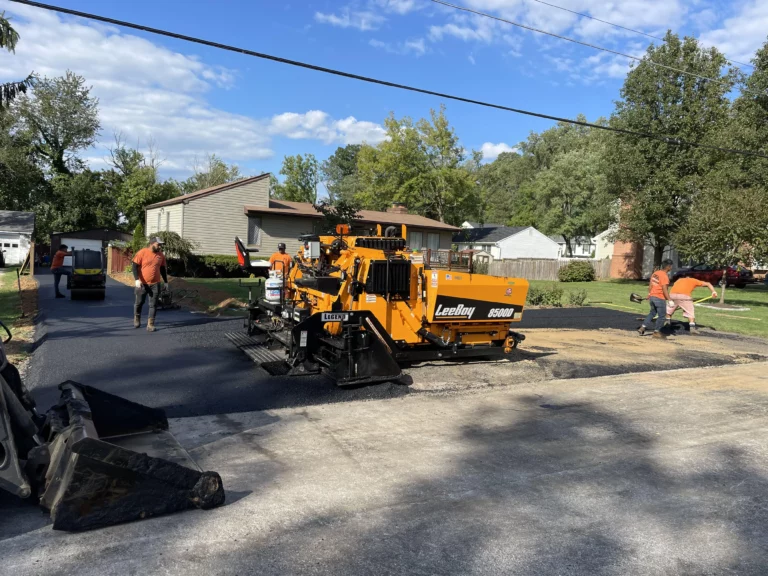
What is Included in the Cost to Pave a Driveway?
The total driveway paving cost includes materials, labor, equipment costs, site preparation and finishing work. Here’s a breakdown of standard pricing:
Materials: This includes the asphalt, concrete, pavers or other surface materials. Material costs range from $2-15 per square foot.
Labor: Skilled paving contractors charge $5-15 per square foot for installation. Complex projects take more time and expertise, impacting labor fees. Ask if the quote includes both skilled workers and general laborers.
Equipment: Paving equipment like compactors and cement mixers carry per-day rental fees that factor into your quote. Contractors may also charge standard fees for minor consumables and tools.
Site Preparation: Your contractor may charge an added fee to remove old surfaces, grade and excavate the site before paving. Extensive drainage work, tree removal or utilities adjustments also add costs.
In Need of Paving Services?
Start Your Project TodayFinishing: Sealing, staining and stamping finishes cost $2-8 per square foot. Decorative accents like borders or color patterns increase the finishing fees.
Permits: Depending on your location and the scale of the job, your contractor may need to secure paving permits which add to your total cost.
Design: For detailed custom jobs, the paving company may charge design fees for drafting plans and calculating layouts.
Mobilization: Contractors sometimes charge a mobilization fee to cover transportation costs for getting workers and equipment to your site.
What is the Average Cost to Pave a Driveway?
The national average cost for asphalt driveway paving is about $7 per square foot, including materials and professional installation. This means a standard 400 square foot two-car driveway would cost around $2,800 on average.
For concrete, expect to pay $8-18 per square foot for materials and labor. The average homeowner spends $3,000 to $7,000 to pave the average sized concrete driveway.
Keep in mind that averages only provide a ballpark figure, and your specific quote depends on factors like your location and the scale of the job. Carefully read all bid proposals to understand what is included versus any additional fees like permits or grading.
You can also save money by providing some materials yourself – for example having driveway gravel delivered rather than your contractor sourcing it. Just make sure you communicate with the paving company first about specifications so you purchase suitable products.
Feel free to check out our concrete services page to learn more!
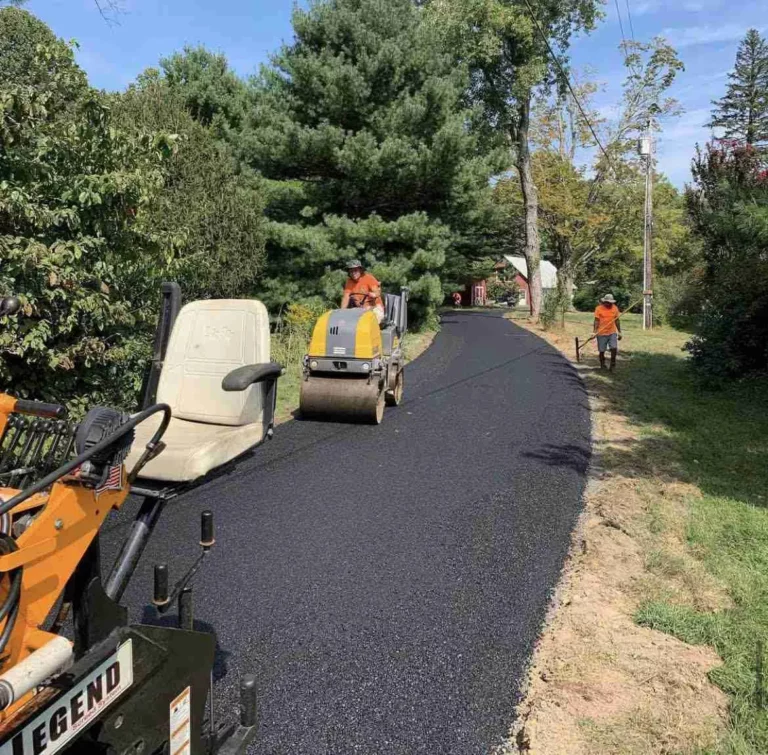
What Factors Affect the Cost of Paving a Driveway?
Many variables influence the total expense of your driveway paving project. Key factors that impact costs include:
Get In Touch!
Text Us For A QuoteLocation – Paving costs are higher in areas with extreme weather fluctuations. Access to local paving materials also affects pricing. Rural areas tend to be cheaper than urban locations.
Materials – Basic asphalt is the least expensive option at $2-5 per square foot. Materials like concrete, brick and paving stones cost $10-25 per square foot. Unique finishes like exposed aggregate and stamped patterns also boost costs.
Size and Layout – The total size of your driveway and aspects like curves, angles and slope add to materials and labor time. Simple straight driveways are the most affordable.
Excavation Needs – Removal and disposal of old surfaces or materials adds $2-6 per square foot. Addressing drainage or grading issues also increases prep fees.
Special Finishes – Stamped patterns, exposed aggregate, borders and color coatings add $2-8 per square foot in labor and materials costs. Keep finishes simple if budget is a concern.
Permits – You may need to pay permit fees based on your location and project scope. Permits often cost a percentage of total project costs.
Scope of Work – The more prep work, grading, drainage improvements and decorative touches included, the higher your total paving costs will be.
The best way to gauge the quality of work from prospective paving companies is checking customer reviews and contacting local references. A company that has paved many driveways in Severna Park should easily be able to provide references from several recent customers in the area. Hearing directly from other customers provides insights you can’t find anywhere else.
What is the Best Material for a Driveway Paver?
Popular driveway paving materials include:
Asphalt – Affordable, durable and low maintenance. Asphalt driveways last 10-20 years. Ideal for colder climates.
Questions About A Project?
Let's Connect!Concrete – More expensive but lasts at least 20 years with proper care. Offers design flexibility. Withstands heavy vehicles.
Paving stones – Natural stone, concrete and brick pavers range widely in price. Provide a classic, distinctive look. Available in many styles.
Gravel – Cheap and easy to install but requires more maintenance and repairs. Best for rural driveways with low traffic.
Choosing the right paving material involves considering your budget, desired lifespan, maintenance needs, climate conditions and aesthetic preferences. Think about the types of vehicles using your driveway as well.
Professionals can advise on the best material options given your location, site features, driveway usage and budget. Ensure contractors have experience with their recommended materials.
Debating between asphalt and concrete? Check out this post here.
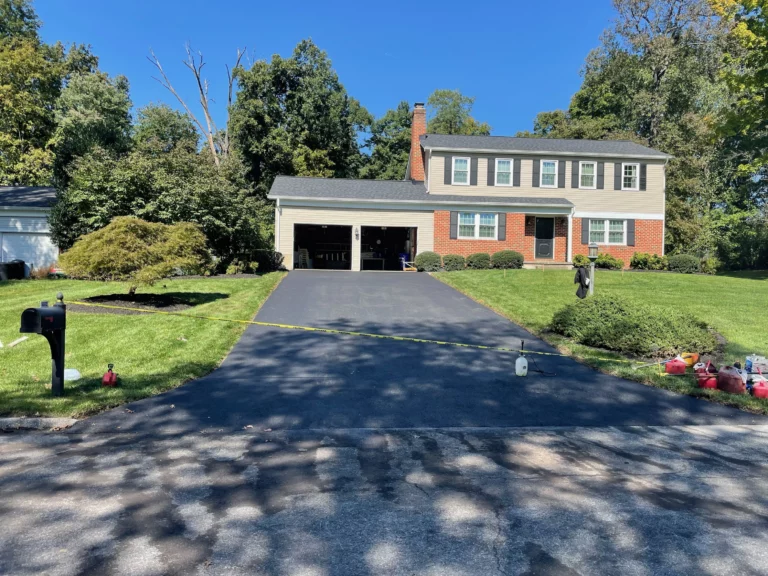
Should I Choose Concrete or Asphalt for My Driveway?
Asphalt and concrete both make solid, long-lasting driveway materials, but they differ in cost and characteristics:
Cost – Asphalt is cheaper, averaging $2-5 per square foot for materials. Concrete costs $8-18 per square foot.
Durability – Concrete withstands heavy use with minimal rutting or cracking. Asphalt needs more repairs over its lifespan.
Maintenance – Concrete requires occasional resealing. Asphalt needs sealcoating every 2-4 years.
Climate – Concrete withstands extreme temperature fluctuations better than asphalt. Asphalt can become very soft in high heat.
Appearance – Concrete offers more design options like patterns, colors and finishes. Asphalt is limited to solid black.
Water Drainage – Concrete sheds water well with proper grading. Asphalt requires sound drainage planning to avoid pooling water.
If you live in a Northern climate with cold winters and need a super-durable surface, concrete is likely the best fit. Where milder weather prevails, affordable asphalt may satisfy your needs.
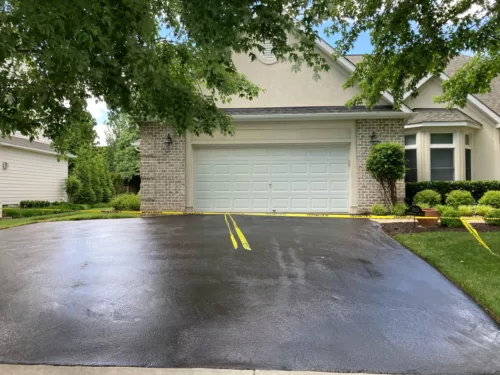
How Long Does a Paved Driveway Last?
With proper installation and care, you can expect these driveway lifespans:
- Asphalt – 10 to 20 years
- Concrete – At least 20 years and often 50+
- Paving stones – 20 to 50 years
- Gravel – 5 to 10 years
Driveway longevity depends on factors like climate, driveway usage, soil conditions, and upkeep. Heavily used driveways or poor drainage will shorten useful life.
Following manufacturer’s care guidelines helps maximize lifespan. Resealing and repairs at the first sign of cracks prevents further damage.
Well-paved driveways by reputable contractors typically last at the high end of typical material lifespans and sometimes exceed them through quality materials and installation.
What Does a Driveway Paving Project Involve?
A professional paving project follows this typical workflow:
Old surface removal and site preparation. Contractors inspect for problem areas.
Base layer installation. This provides a stable foundation for paving above.
Paving material application and compaction. Materials are layered and compacted in sections.
Drainage and edge work. This keeps water flowing away from the driveway.
Curing time for concrete. Concrete needs days to fully set before use.
Sealing and finishing steps like stamping patterns or staining colors.
Cleanup work, grading adjustments and site restoration.
Reputable paving companies have the right tools, materials and process knowledge to ensure quality results from start to finish. Each step is essential for durability and functionality.
Thorough site preparation and grading prevents settlement cracks and potholes after paving. Proper drainage and base materials keep your driveway stable year after year. And finishes add aesthetic appeal.
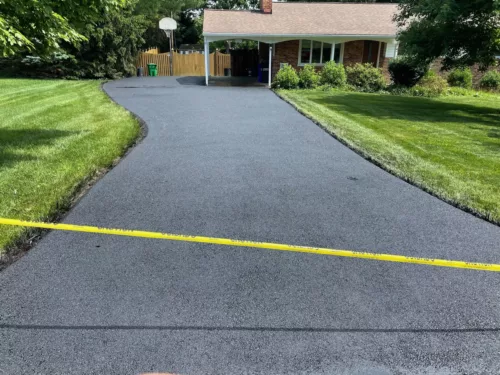
What are the Key Benefits of Professional Driveway Paving?
Investing in a pro-paved driveway brings many valuable advantages:
Enhanced Curb Appeal – Smooth new paving and finishes greatly improve your home’s aesthetic. First impressions matter to visitors and potential home buyers.
Increased Value – A pristine driveway can boost your home’s value by thousands before selling. Kerb appeal draws more potential buyers.
Durability – Proper subgrade prep and material installation prevents cracks and potholes. Expert compaction and drainage prevents erosion.
Low Maintenance – Professional paving requires little upkeep compared to DIY driveways. The work is warrantied for defects and longevity.
Safety – New paving provides a non-slip, even surface for walking and driving. Consistent traction prevents falls.
Long Lifespan – Contractors use techniques that maximize driveway longevity. Quality materials withstand your local climate.
Consistency – Unlike DIY work, professionals deliver uniform texture and smoothness from edge to edge.
Warranties – Reputable companies offer multi-year warranties backing their paving workmanship.
Efficiency – Having pros complete the job in a few days is faster than tackling it solo over weeks or months.
Convenience – Your contractor handles all the heavy work, skill-intensive steps as well as material deliveries.
What Questions Should I Ask Paving Contractors?
Choosing the right paving company is key to getting a high-quality driveway. Ask prospective contractors these questions:
How long have you been in business paving driveways? Look for 5+ years of experience.
Are you licensed and insured for liability, property damage and workers compensation?
Can you provide customer references from recent paving jobs completed nearby?
Will you provide a detailed written quote for all costs and project steps? Avoid vague verbal quotes.
Do you offer a warranty on your paving materials and workmanship? How long does coverage last?
Will you handle securing any necessary paving permits for my project?
Do you employ experienced paving crews rather than subcontractors?
What safety precautions will you take during my project? This includes traffic control if needed.
How soon before I can use my driveway after paving is complete?
How will you dispose of old paving materials removed from my existing driveway?
Signs of a Good Paving Contractor
Look for these indicators you’ve found a professional, reputable driveway paving contractor:
Have a documented company history of satisfied driveway customers. Ask for references.
Employ their own paving crews rather than outsourcing. This ensures oversight and consistent quality.
Are licensed, insured and bonded for full coverage of property risks.
Provide a detailed quote in writing outlining exactly what is and isn’t included in costs.
Offer at least a 5-year workmanship warranty on new paving installations.
Have expertise working with different paving materials like concrete, asphalt, pavers etc.
Own and operate their own equipment like pavers and compactors.
Maintain an office location and staffed phone line during normal business hours.
Are recognized members of industry associations like NAPA and NRMCA.
Key Takeaways
Professional paving costs $3-25 per square foot for materials and labor. Most homeowners spend $2,000 to $7,000.
Many factors like materials, size, preparation work and location impact the total cost.
Materials like asphalt, concrete, pavers and gravel each have pros and cons.
Pro paving yields a smooth, durable driveway that can last over 20 years.
The right paving company uses specialized techniques you can’t match with DIY work.
Investing in a professionally paved driveway costs more upfront but saves you money and headaches over your driveway’s lifespan. For quality that improves curb appeal, safety and home value, trust the driveway paving experts. They have the skills and equipment to build you a premium driveway that will serve you well for decades to come.
FAQs - Frequently Asked Questions
1. What are the different types of driveway materials available?
The different types of driveway materials available include gravel driveway, heated driveway, asphalt paving, and concrete and asphalt.
2. How much does it cost to install a new driveway?
The cost of installing a new driveway depends on various factors such as the chosen material, size of the driveway, and additional features. On average, the cost per square foot for a new driveway can range from $15 to $25.
3. What is the cost per square foot for a driveway installation?
The cost per square foot for driveway installation can vary depending on factors like the type of material and any additional features. Typically, the cost can range from $10 to $18 per square foot.
4. Are driveway pavers a good option?
Yes, driveway pavers are a popular and durable option for driveways. They offer versatility in design, easy maintenance, and long-lasting performance.
5. How much does it cost to pave a driveway with pavers?
The cost to pave a driveway with pavers can vary based on factors like the size of the driveway and the type of pavers chosen. On average, the cost can range from $7 to $15 per square foot.
6. What are the advantages of an asphalt driveway?
Asphalt driveways are known for their durability, affordability, and ease of installation. They offer a smooth surface, are resistant to weather conditions, and require minimal maintenance.
7. How much does it cost to have an asphalt driveway?
The cost of an asphalt driveway can vary based on factors like the size of the driveway and the region. On average, the cost can range from $7 to $10 per square foot.
8. What is the best driveway paving option?
The best driveway paving option depends on various factors such as budget, desired aesthetics, and climate. However, asphalt and concrete are popular choices due to their durability and cost-effectiveness.
9. How can I estimate the cost of a new driveway?
You can estimate the cost of a new driveway by considering factors such as the desired material, size of the driveway, any additional features, and getting quotes from reputable contractors.
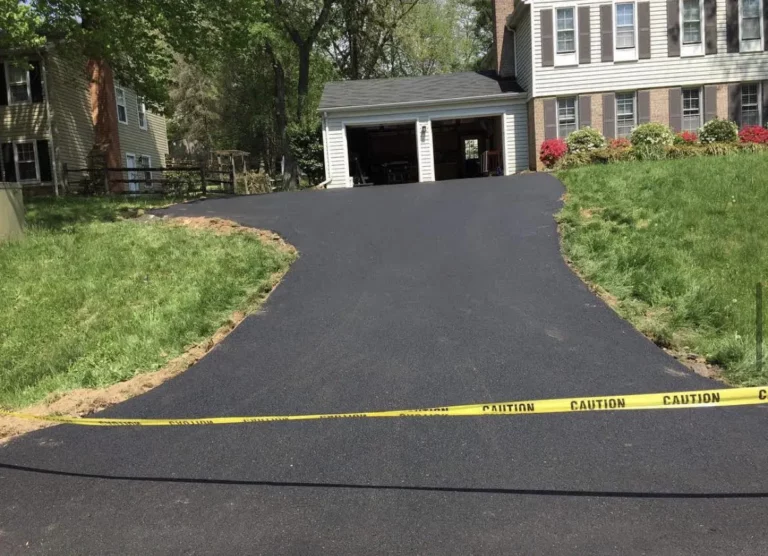
Residential Paving
Get A Free Same Day Quote
Let's connect for a free, no hassle same day quote. Enter your information below to get the conversation started!